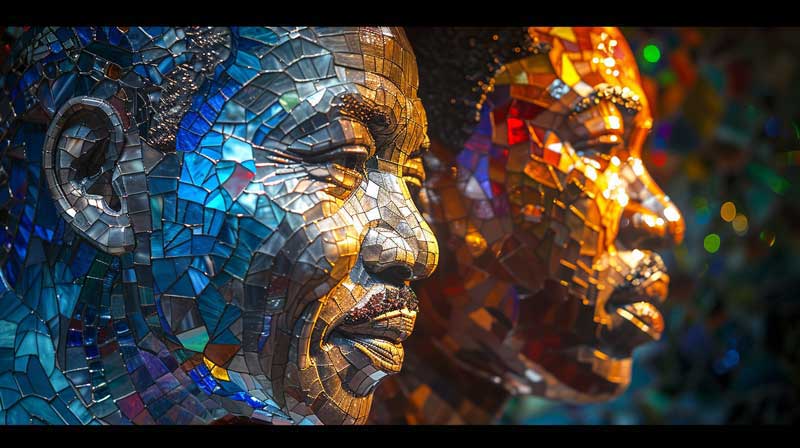Your character forms the core of who you are. It’s the foundation upon which you build your life, relationships, and legacy. But what happens when someone attempts to undermine or destroy this essential part of you?
Recent events in my life have led me to ponder this question sincerely. I’ve faced challenges that threatened to shake the very essence of who I am. I’ve been compelled to examine the nature of character and its resilience in the face of adversity.
This exploration is born from real-world experiences that have tested my resolve and forced me to confront fundamental questions about identity and integrity. Amidst these testing times, I’ve understood that your character is more than just a set of traits or behaviours – it’s the culmination of your values, experiences, and choices.
In this post, I will examine character, drawing inspiration from great leaders and thinkers grappling with similar questions. We’ll explore how your character shapes your life and whether it’s genuinely possible for others to destroy something so intrinsic to your being.
Defining Your Character: The Essence of Who We Are
Your character is the purest form of yourself. It’s a collection of traits, habits, and the very essence of who you are at your core. Your character defines your integrity, shapes your purpose, and guides every move. Decency, morality, strength and compassion come to mind.
To truly grasp your character’s concept, imagine it as a living, breathing entity like your own body. Just as your body is a complex system of interconnected parts, your character is a multifaceted representation of your true self.
At the outermost layer, your character is like your skin – it’s what interacts with the world, shaped by your experiences and encounters. Beneath this surface lies the bones of your character – the core structure that gives you strength and stability in the face of life’s challenges.
Wrapped around these bones are the muscles of your character – the actions and decisions you make that reflect your values and beliefs. These muscles grow stronger with each choice you make that aligns with your true self.
At the centre of your character lie the vital organs – your passions, your deepest beliefs, and your moral compass. Just as your heart pumps life-giving blood through your body, these core elements of your character infuse every aspect of your life with meaning and purpose.
Your character begins to form at the very moment of your conception, much like the meeting of sperm and egg. From that point on, it grows and develops, influenced by your experiences, choices, and the values instilled in you by those around you.
As Abraham Lincoln wisely noted:
Character is like a tree and reputation like its shadow. The shadow is what we think of it; the tree is the real thing.
It’s not something fleeting or superficial. Your character is the tree – solid, enduring, and accurate. It’s not something that can be easily swayed or uprooted by the opinions or actions of others.

Learning from the Best Inspirational Voices on Character
Your character is shaped by the people around you, your experiences, and the values you embrace. My voyage in understanding and developing my character began in childhood, influenced by remarkable individuals in my family and beyond.
From a young age, I was blessed with amazing parents who embodied strong character. My father was a pillar of principles, loyalty, direction, and purpose. My mother, with her endless compassion, showed me the importance of empathy. Their influence on my sister and me was profound, setting a high standard for character.
My time in Ghana further shaped my understanding, particularly my grandmother’s. I watched her interact with those around her, especially the house helpers. She went beyond mere kindness, ensuring that all the house helpers’ children received an education, personally funding their schooling.
This wasn’t a one-off act of charity but a consistent commitment to improving lives. My grandmother’s endless care for others, regardless of their social status, left an indelible mark on my young mind. She showed me that your character is reflected most clearly in how you treat those who can offer nothing in return.
I learned what true character means by watching her in full flow, being her natural, compassionate self. This early foundation, built on the actions of my family, set the stage for my lifelong commitment to creating a character that others might aspire to emulate.
Beyond my family, I’ve drawn inspiration from great leaders whose words and actions have profoundly impacted my understanding of character. Nelson Mandela, Rosa Parks, Malcolm X, Martin Luther King Jr, Mother Teresa, and Mahatma Gandhi stand out as beacons of integrity and moral courage.
These individuals have inspired me to strive for personal growth and taught me the importance of standing up for what’s right, even in adversity. Their teachings have been instrumental in shaping my character, setting a standard that I continually strive to reach. Knowing that even a fraction of their integrity and resilience would be remarkable.
Let’s explore the insights of two inspirational figures and how they’ve influenced my understanding of your character.
Martin Luther King Jr Judged by Your Character Not Colour
Martin Luther King Jr.’s words on the character have resonated with me since I was 16, facing the harsh realities of racism in East London. His dream of a world where people are judged not by their skin colour but by the content of their character spoke directly to my experiences. King’s famous words still ring true today:
I have a dream that my four little children will one day live in a nation where they will not be judged by the colour of their skin but by the content of their character.
This profound statement challenged me to ensure that my character would precede my skin colour. It motivated me to work tirelessly on developing my character and conducting myself in a way that reflected my true self beyond superficial attributes.
I also dream of the day when your character will speak louder than your appearance, a goal that has shaped my actions and decisions throughout my life.
Nelson Mandela’s Unwavering Principles in the Face of Adversity
Nelson Mandela’s life and words offer potent lessons about maintaining character even in extreme adversity. Despite decades of imprisonment, his unwavering commitment to his principles exemplifies the strength of true character.
Mandela’s famous speech at the Rivonia Trial in 1964; the statement from the dock at the opening of the defence case in the Rivonia Trial, Pretoria Supreme Court, 20 April 1964. Stands as a testament to your character’s power in the face of injustice.
This speech, delivered while facing the possibility of a death sentence, has become one of the most famous statements of character and principle in the 20th century. Let’s examine some critical aspects of Mandela’s character through his own words from this historic speech:
- Personal Integrity and Motivations:
I hoped then that life might offer me the opportunity to serve my people and make my own humble contribution to their freedom struggle. This is what has motivated me in all that I have done in relation to the charges made against me in this case.
- Moral and Ethical Standards:
Having said this, I must deal immediately and at some length with the question of violence. Some of the things so far told to the Court are true and some are untrue. I do not, however, deny that I planned sabotage. I did not plan it in a spirit of recklessness, nor because I have any love of violence. I planned it as a result of a calm and sober assessment of the political situation that had arisen after many years of tyranny, exploitation, and oppression of my people by the whites.
- Commitment to Non-Racialism:
We believe that South Africa belongs to all the people who live in it, and not to one group, be it black or white.
- Vision for a Just Society:
During my lifetime I have dedicated myself to this struggle of the African people. I have fought against white domination, and I have fought against black domination. I have cherished the ideal of a democratic and free society in which all persons live together in harmony and with equal opportunities. It is an ideal which I hope to live for and to achieve. But if needs be, it is an ideal for which I am prepared to die.
These passages demonstrate Mandela’s strong character, commitment to justice and equality, and willingness to sacrifice for his principles. They are potent reflections of his integrity, illustrating his deep commitment to ethical conduct.
His thoughtful approach to difficult decisions and his unwavering dedication to the cause of freedom and equality. Mandela’s words and actions show how your character can force change, inspiring others and shaping history.

After exploring the essence of character and drawing inspiration from great leaders, we return to our central question: can others destroy your character?
The simple answer is no. Your character, built over a lifetime of experiences, choices, and values, is not something others can easily dismantle. However, this doesn’t mean your character isn’t challenged or tested by the actions of others.
When faced with adversity, particularly when someone attempts to undermine your integrity, it’s natural to feel shaken. You might wonder if others’ perceptions could alter who you are. Yet, it’s precisely in these moments that your character shines brightest.
Consider this: if your character could be destroyed by others’ actions or words, would it be yours? Your character is not a fragile construct built on others’ opinions but a robust foundation of your own.
Those who attempt to tarnish your character often do so to hide their own misdeeds or shortcomings. Their actions speak more about their character than yours. By maintaining your integrity in the face of such challenges, you demonstrate the strength of your character.
Remember, your character is like a well-rooted tree. It may bend in strong winds but doesn’t break, like bamboo swaying with the wind. Each challenge you face is an opportunity to reinforce your values and strengthen your resolve.
Moreover, your character is not static. It grows and evolves with each experience. Even negative experiences, such as someone attempting to destroy your character, can lead to growth. They offer a chance for self-reflection, reaffirming what you stand for and why.
In the end, only you have the power to shape your character. Others may influence your journey, but they can’t dictate its course. Your character is a reflection of your choices, your values, and your integrity – elements that are fundamentally yours.
In the face of adversity or negativity, stand firm in your convictions. Let your actions speak louder than any words or actions hurled against you. Your character, cultivated over a lifetime, will withstand the test of time and the challenges others pose. The fundamental truth, as I see it, is:
Your character is a fortress you’ve built stone by stone. No one else has the right to tear it down – that power belongs to you alone.


